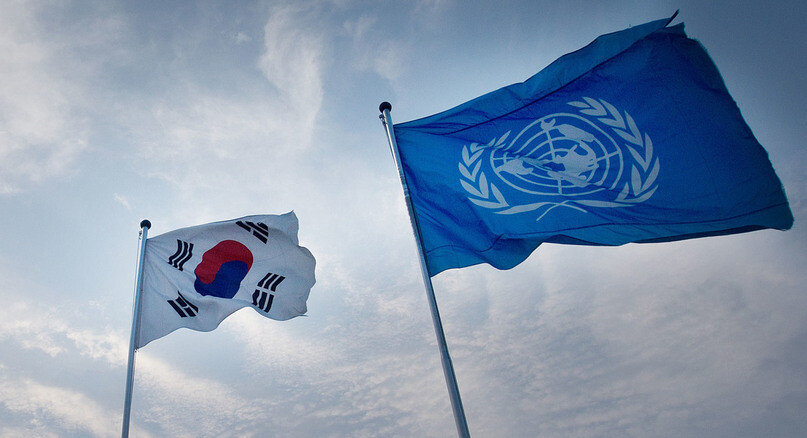hankyoreh
Links to other country sites 다른 나라 사이트 링크
[Editorial] US needs to let S. Korea take charge of its own military affairs

Reports indicate that the US has insisted that the United Nations Command (UNC), which is currently charged with maintaining and overseeing the armistice agreement, should also take part in managing crisis situations on the Korean Peninsula after South Korea recovers operational control of its military, known as the OPCON transfer. This appears to be an attempt by the US army to stay in charge of military activities on the Korean Peninsula via the UNC even after a South Korean general takes charge of the ROK-US Combined Forces Command (CFC) in the early or mid-2020s. Such an attempt runs contrary to the spirit of the OPCON transfer. If the US didn’t intend to yield control to the South Korean military, why would it have agreed to the OPCON transfer in the first place? The US needs to rethink its plan to continue exercising military leadership via the UNC.
Currently OPCON is entrusted to the CFC commander. The OPCON transfer will involve putting a South Korean general in charge of the CFC, rather than an American general, per tradition. In the ROK-US joint command post exercise last month, the two sides prepared for the OPCON transfer by having a South Korean four-star general play the role of the CFC commander.
The peacetime role of the UNC, in contrast, is to maintain and supervise the armistice agreement, while its wartime role is to collect forces from UN member states and play a secondary role in assisting the CFC. But recently, the American military has advanced the controversial argument that a North Korean invasion would constitute a violation of the armistice agreement and that the UNC’s role should be strengthened accordingly. That can only be seen as an attempt by the American military to keep exercising effective military control by expanding the role of the UNC even after the OPCON transfer.
Of course, there’s nothing new about the US military’s efforts to expand the function and role of the UNC. While the major positions at the UNC had once been concurrently held by CFC officers, the UNC has been assigned separate officers and given a stronger role over the past few years. There has also been an attempt to reorganize the UNC into a multilateral military system, with Canadian and Australian generals appointed as deputy commanders of the UNC last year.
Another idea is that the US is concerned that the OPCON transfer would be a violation of the Pershing principle, namely that American troops aren’t placed under the command of foreign militaries. But if the American military is seeking to use the UNC as a means of staying in charge even after the OPCON transfer, that should be called out as an anachronistic attitude. The power and prestige of the South Korean military is markedly different from before. It’s desirable for the American military to acknowledge that the South Korean military is in charge and to assume a supportive role after the OPCON transfer.
Please direct comments or questions to [english@hani.co.kr]
Caption: The South Korean and United Nations Command flags stand next to each other.

Editorial・opinion
![[Column] Has Korea, too, crossed the Rubicon on China? [Column] Has Korea, too, crossed the Rubicon on China?](https://flexible.img.hani.co.kr/flexible/normal/500/300/imgdb/original/2024/0419/9317135153409185.jpg) [Column] Has Korea, too, crossed the Rubicon on China?
[Column] Has Korea, too, crossed the Rubicon on China?![[Correspondent’s column] In Japan’s alliance with US, echoes of its past alliances with UK [Correspondent’s column] In Japan’s alliance with US, echoes of its past alliances with UK](https://flexible.img.hani.co.kr/flexible/normal/500/300/imgdb/original/2024/0419/2317135166563519.jpg) [Correspondent’s column] In Japan’s alliance with US, echoes of its past alliances with UK
[Correspondent’s column] In Japan’s alliance with US, echoes of its past alliances with UK- [Editorial] Does Yoon think the Korean public is wrong?
- [Editorial] As it bolsters its alliance with US, Japan must be accountable for past
- [Guest essay] Amending the Constitution is Yoon’s key to leaving office in public’s good graces
- [Editorial] 10 years on, lessons of Sewol tragedy must never be forgotten
- [Column] A death blow to Korea’s prosecutor politics
- [Correspondent’s column] The US and the end of Japanese pacifism
- [Guest essay] How Korea turned its trainee doctors into monsters
- [Guest essay] As someone who helped forge Seoul-Moscow ties, their status today troubles me
Most viewed articles
- 1[Column] The clock is ticking for Korea’s first lady
- 2Samsung barricades office as unionized workers strike for better conditions
- 3[Correspondent’s column] In Japan’s alliance with US, echoes of its past alliances with UK
- 4After 2 months of delayed, denied medical care, Koreans worry worst may be yet to come
- 5[Column] Has Korea, too, crossed the Rubicon on China?
- 6Hong Se-hwa, voice for tolerance whose memoir of exile touched a chord, dies at 76
- 7US overtakes China as Korea’s top export market, prompting trade sanction jitters
- 8All eyes on Xiaomi after it pulls off EV that Apple couldn’t
- 9[Photo] Smile ambassador, you’re on camera
- 10[News analysis] After elections, prosecutorial reform will likely make legislative agenda